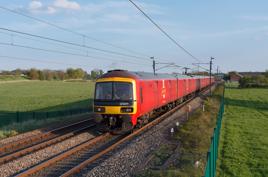Royal Mail’s decision to end its involvement with rail from October 10 (see Network News, pages 10-11) seems inevitable. Most of us might have been forgiven for thinking that it fizzled out a long time ago.
Discussing how to keep the remaining 3% of Royal Mail’s total business on the railway is unlikely to warrant any discussion time in the new Labour government’s busy schedule.
However, understanding the company’s £419 million loss last year, and getting its controversial £3.7 billion takeover by a Czech tycoon past the unions, surely will.
The question is: can new fast parcels carrier Varamis Rail (and others) expand quickly enough to fill some of the gap created by Royal Mail’s withdrawal in a little over three months’ time?
Varamis is a chink of sunshine through some dark clouds, claiming to be faster, cheaper and greener - although this is all about shifting parcels and bulky items and not letters, over which the Royal Mail currently has a monopoly.
It has enjoyed start-up funding from the Department for Transport, and most importantly its entrepreneurial initiative was warmly endorsed by new Rail Minister Lord Hendy at a launch event in London on March 13. We all hope that he will continue with the same support.
Rail Freight Group Director General Maggie Simpson also said that Varamis “underscores the pivotal role of rail freight in reshaping the transport landscape… collaboration between rail and logistics industry stakeholders remains paramount in realising the vision of a greener, more efficient urban freight network with rail at the centre”.
Varamis has a fleet of reconfigured Class 321 units. RAIL has reported that it has had options on ten four-car units that would have otherwise gone for scrap, but could it now go for the Royal Mail’s older ‘320s’ instead, as they do not need any conversion work?
The new Labour government has chosen ‘nationalisation’ as a broad brushstroke remedy for the UK’s railways, although this seems to be targeted at passenger operators because the multi-national freight industry is out of bounds. However, it can easily intervene to make parcels and letter traffic attractive again, if it so wishes.
Can it somehow rekindle the relationship with DB, which maintains Royal Mail’s life-expired Class 325s? A good percentage of them don’t run anyway - and if they are truly worn out, the Government will have to find some money because Royal Mail certainly doesn’t have any spare cash.
As a rough comparison, the extra Class 345s ordered from Alstom at Derby for the Elizabeth line will run out at around £3m a vehicle, so like-for-like new parcels vehicles have a price tag of around £100m. And we haven’t even mentioned track access charges or the rising cost of electricity yet.
Even if the Greens had become the new ruling party, we couldn’t count on their total support, because Royal Mail is steadily converting its road fleet of 6,200 trucks and trailers (and 41,500 local delivery vans) to electricity in pursuit of its Net Zero policy, as well as cutting its dependence on domestic flights by half.
Meanwhile, large-scale parcel shippers (notably Amazon) have so far steered clear of the rail debate. At the same time, the unregulated ‘white van man’ with low overheads has found a niche that no large company can possibly compete with.
The fortunes of the railway and the types of traffic it has carried have naturally always mirrored the changing economy, so why should the postal service be any different?
Like all freight, rail mail’s total dominance has undergone the same revolution over the past four decades. But the relationship has been severely strained since the late 1970s, when efficiency measures were first applied with some seriousness. Coal, steel, and wagonload traffic have also all virtually gone, so what lessons can we learn from this latest sad story?
Rail mail’s fortunes used to run in tandem with the also defunct newspapers traffic. Many of us can recall the flurry of activity at major stations around midnight, when meshed blue trolleys known as ‘BRUTEs’ (British Rail Universal Trolley Equipment) were piled high with mailbags and parcels, rattling over the bridges between platforms for fast loading into trains departing in all directions.
We didn’t know that it was all on borrowed time. British Rail was already under scrutiny for its inability to provide an efficient wagon door-to-customer service, and national newspaper owners realised that they could save a fortune by printing their titles in smaller numbers on provincial presses to eliminate long journeys, and also extend their deadlines.
BR cottoned on that Royal Mail also wanted better, and it went to great lengths to improve the commercial relationship in 1988, when the contract was due for renewal.
It committed itself to 90% of the 250 dedicated mail trains arriving within ten minutes of schedule, for which bonuses would be paid. It even specified the type of locomotives to be used (72 refreshed Class 47/7s, followed by 30 brand new Class 67s), and improved maintenance regimes of the large fleet of dedicated elderly vans.
Everything then went wrong within two years, because of a combination of strikes, frequent equipment failures and poor timekeeping, and those bonuses quickly turned into heavy penalties (coupled with discontent). The axe fell on the overnight business in January 2004, the rolling stock was mothballed or broken up, while station and depot infrastructure was irreversibly repurposed or simply sold off.
Then there was privatisation, with a commitment from Royal Mail to create road/rail hubs with good road and rail connections, a £50m central facility at Willesden in north London, and those 16 100mph Class 325 units.
It made little difference, and relationships worsened to the point that Royal Mail stated that despite its investment, it was getting out of overnight trains within two years. The final Travelling Post Office train ran without ceremony on January 9 2004. The Class 325s went into warm store and have only seen sporadic use since.
RAIL agrees entirely with the sentiments of DB CEO Andrea Rossi, who says the new government must find ways to level the playing field between rail freight and the heavily subsidised road haulage sector. Otherwise, how will it achieve the grand plan to boost the switch to rail by 75% in 2050?
It was once seen as an easy target, but is that still the case? That’s an immediate answer we’ll be expecting from new Transport Secretary Louise Haigh.
















Login to comment
Comments
No comments have been made yet.